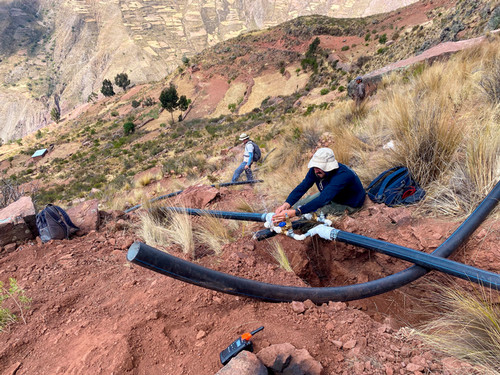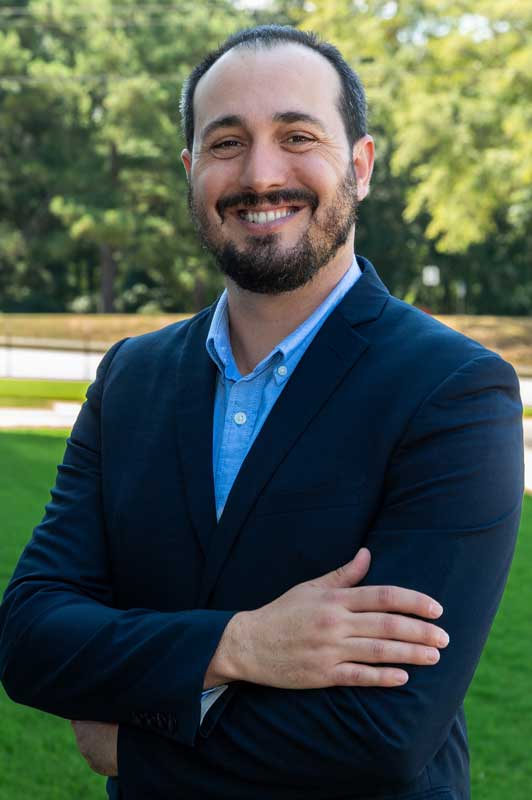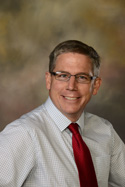From rain gauges to relationships: Auburn Engineers build more than infrastructure in Bolivian village
Published: Sep 25, 2025 7:45 AM
By Joe McAdory
Maggie McCallum and Marissa Barone didn't just volunteer to teach Bolivian schoolchildren in the tiny mountainous village of Quesimpuco — they introduced them to the power of collecting water data and the role it plays in sustaining their community.
Members of Auburn University's Engineers Without Borders (EWB) chapter taught children how to measure daily rainfall using gauges, record and interpret the data, recognize seasonal patterns and understand how this information can be applied during the team's visit Aug. 9-19.
“For them, water is life,” said McCallum, a senior in chemical engineering. “Water means economic stability and food security. The kids in the community are the future leaders and will inherit their families' farmlands. We wanted to empower the children to take ownership.”
McCallum and Barone instructed students ranging from second graders to high school.
“I hope these children learn that the work is not only for the grown-ups, but that their help and ideas are just as important,” said Barone, a senior in civil and environmental engineering. “Collecting this kind of data is critical for our project because we don't currently have anything solid from their past rainy seasons.”
Bolivia's seasons range from one extreme to another. Six months of rain, followed by six months of drought. During the dry season, families in the heart of the Andes Mountains can barely grow enough food to feed themselves, let alone produce crops to sell.
The village lacks consistent access to water for farming and daily use, making it difficult to sustain crops and livelihoods year-round. Without proper infrastructure to capture, store and distribute rainfall, much of the water goes unused, and the community struggles during the dry months.
That's where EWB comes in. EWB is a student-led, service-oriented engineering organization that partners with underserved communities — domestically and internationally — to design and implement sustainable infrastructure projects focused on water, sanitation, and other basic human needs. Chartered in 2014 after working in Bolivia since 2008, the chapter is part of the larger EWB-USA network and provides students with real-world experience. Through projects in Guatemala (clean water), Bolivia (irrigation and potable systems), and regional domestic efforts, Auburn-EWB blends hands-on engineering, community collaboration, and student leadership to transform lives.
Joining Barone and McCallum this past August in Bolivia were Addison Faggard, a senior in chemical engineering, Ethan Lynde, a senior in civil and environmental engineering, Dylan Morgan, a sophomore in mechanical engineering, Jack Patty, a senior in civil and environmental engineering, Gavin Valentine, a senior in biosystems engineering, Jack Montgomery, a faculty advisor and associate professor in civil and environmental engineering and Joseph Ragan, a faculty advisor and senior lecturer in mechanical engineering.
The team's solution sounds straightforward enough: capture water from a natural mountain spring during the wet season, store it in a massive concrete tank, then pipe it down to the fields when the rain stops.
This past August, Auburn engineers installed more than half a mile of pipeline, including pressure-reducing stations to handle a 600-foot elevation drop. The work builds on previous trips that focused on channeling spring water over two kilometers into a 100,000-liter storage tank. The team plans to return next year to continue building the system with the goal of using sprinklers to irrigate fields that serve approximately 60 families.

“We don't want to just leave the project there; we want it to be sustainable in the long term,” said McCallum, who recently signed an offer to work full-time at ExxonMobil in Houston after graduating in May 2026.
While laying important irrigation pipeline was the focus of the trip, McCallum and Barone turned their attention to the children who will one day inherit the land and the responsibility of sustaining it.
“Our main goal was to introduce the children to the concept of collecting data on their daily rainfall during Bolivia's rainy season and how this information is important in the life of our project,” Barone said.
The data the children collect over the next year will help the Auburn team figure out exactly how much water falls during the wet season and how much needs to be stored for the dry months ahead.
“The opportunity to teach the kids about water collection really reinforced how vital the human side of engineering is — the listening, teaching, collaborating and learning from others,” McCallum said. “It showed me that those things matter just as much as the technical work. While we go to work on the technical project, we come back having learned so much from the community. We get to work alongside them and see their knowledge, creativity, and how they approach problems with the resources they have.”
Barone, who is working as a project management Co-Op with Brasfield & Gorrie this fall in Nashville, said the children’s enthusiasm to learn was infectious.
“All of the children were always eager to learn from us,” Barone said. “They were very attentive and responsive during our time in the classroom and frequently visited our jobsite to learn more about what we were doing and observe the daily events.”
Over multiple trips to Bolivia, Barone has watched relationships develop across cultural and language divides.
“I have developed a friendship with two little girls who are sisters over the last two years I’ve traveled, and I think of them often,” she said. “Despite a tough language barrier, we learned to enjoy each other’s company and delight in simply being one another’s friend, understanding that each of us is learning from the other in different ways.
“I hope these children learn that the work is not only for the grown-ups, but that their help and ideas are just as important. I hope that they can develop and build on their knowledge to help continue the project alongside their families as we continue to visit them every year. I also hope that this stands as an inspiration and encouragement to them if they have any ideas or innovations that they dream of bringing to life.”
Media Contact: , jem0040@auburn.edu, 334.844.3447
Children in Quesimpuco, Bolivia, were taught how to measure rainfall with gauges, record and interpret the data, recognize seasonal patterns and better understand how this information can be applied.



